Para una traduccion al espanol, haga clic aqui.
I’ve been struggling with how to make sense of the scene at the end of the most recent Game of Thrones episode. This scene, where we were made to watch the violation of Sansa Stark, is something that I haven’t been able to stop thinking about, and something I’ve found immensely upsetting. It is also something that does not happen in the books this show is supposedly adapting.
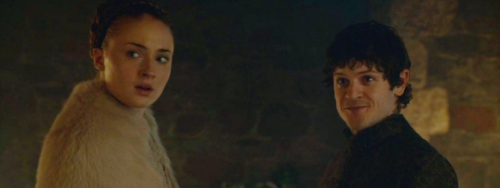
Yes, in George R.R. Martin’s A Dance with Dragons, there is a tertiary character who suffers great horrors at the hands of Ramsay Bolton—a character who is supposed to be posing as a Stark of Winterfell, even though almost everyone around her knows she is a fraud. This character, Jeyne Poole, exists mostly in Theon’s storyline, but her story also serves as a remarkable foil to Sansa, her old childhood friend. I have touched on it here, but both girls were made victims at the hands of Littlefinger. And the different ways they respond to that victimization is meant to be paralleled. Jeyne’s mode of survival is to try and always acquiesce to the will of her tormentors to make her life easier; Sansa, on the other hand, continually demonstrates subtle acts of resistance and assertions of her own desires. This difference in approach serves as a commentary on the experience of a girl with the right family name vs. one without, and it is also done with respect to their individual personalities.
In addition to that narrative significance, Jeyne doesn’t disappear from the narrative once Ramsay is done with her. Her existence stands on its own: everyone within Winterfell (great Northern Lords), know exactly what torment she is suffering, but no one so much as lifts a finger to help her because she doesn’t matter to anyone. She is of lower birth and not deemed worthy of help. Theon’s empathy and aid towards her, therefore, is marked and this very much matters in his own arc. Jeyne Poole is a thousand other girls in Westeros who are exploited and harmed because they don’t matter; yet now she has a face. The author won’t let us forget her. That matters, and as “minor” as she is, Jeyne matters to the overarching themes of the story.
This is why I firmly talk about how depiction is not equatable to endorsement. Martin does depict violence against women, but the way in which he does so is with an aim of higher critique; it is quite clear he doesn’t endorse it. In short, it is not to titillate or to shock, but to service his narrative. And the uncomfortable familiarity of this brutality against women–a familiarity that we still have in today’s society–is what makes it so simultaneously affecting and effective.
Therefore, the rape of Jeyne in the books cannot be compared to Sunday’s rape of Sansa. Jeyne’s suffering was the point. Further, the argument that it’s unfair to have Jeyne’s rape exist solely through Theon’s eyes is mitigated by the fact that Theon was raped during the wedding night as well. The entire scene was meant to horrify us. But it was included to a much larger purpose, with a clear logic and awareness on the part of the author. It came to pass and unfolded in a way that was consistent with the characterizations of the players involved. In other words, it was not, in any respect, “gratuitous.”
Sansa, however, is her own character and a series protagonist. She has her own arc within the larger narrative, and it most certainly does not involve her being raped. Blithely placing Sansa into Jeyne’s role utterly destroys the significance of both stories, and it relegates Sansa to become a silent sufferer…a role intended to be filled by someone who “doesn’t matter.”
Were the adaptors worried about being able to create that role for Season 5 without confusing the audience? They didn’t really establish Jeyne Poole well in Season 1, and frankly it probably would have been difficult to pull that out of their hat. However, that doesn’t mean they were required to have anyone fill that role, or that it makes it “interesting” to fill it with someone that gives us “buy-in” (the current Bryan Cogman defense, the writer of the episode). In fact, good adaptations loosely follow the rule “it’s better to cut something than to change it.” Yes, Jeyne matters thematically and matters to Theon’s arc. But Sansa matters thematically and matters to her own arc. Changing the plot to force Sansa into a role that flies in the face of her development is a bad adaptational decision, plain and simple. This was a rape that need not have happened at all. And it marked a prioritization of Theon’s arc over Sansa Stark.
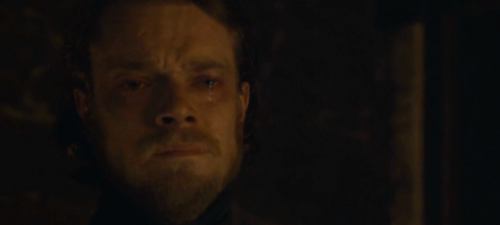
So then what “sense” is there to make of this? Showrunners David Benioff and Dan Weiss (D&D) assert that Sansa is one of their favorite characters and the one who they care about “almost more than any other.” Yet they went out of their way to put her into a passive role, effectively sidelining her from her own narrative. They did it to shock us, and to add to the horror of the act, as if we couldn’t have mustered the empathy for a character we didn’t know.
The thing is, no matter what D&D assert, their actions speak louder. Scripting Sansa’s rape was tactless, thoughtless, and disgusting. They clearly didn’t “care” about her character; they were willing to defy all logic just to place her as an objectified victim at the cost of everything on which her character is based. But it’s more than that…they have never cared about Sansa. In fact, their portrayal of her story has been colored by incredibly sexist assumptions and a total devaluing of her skills/mode of survival.
The thing to understand about Sansa is that she is a very internal character. Her mind may whir away for paragraphs, though she’ll only speak a few words. She also has an excellent read on individuals with her remarkable intuition, but never verbalizes those thoughts:
‘When Sansa finally looked up, a man was standing over her, staring. He was short, with a pointed beard and a silver streak in his hair, almost as old as her father. “You must be one of her daughters,” he said to her. He had grey-green eyes that did not smile when his mouth did. “You have the Tully look.”
“I’m Sansa Stark,” she said, ill at ease. The man wore a heavy cloak with a fur collar, fastened with a silver mockingbird, and he had the effortless manner of a high lord, but she did not know him. “I have not had the honor, my lord.” (emphasis mine)’
Therefore, adapting Sansa to the visual medium is an undertaking, especially to do so in a way that interests the audience and keeps them sympathetic towards her. At the start of her arc, Sansa is a sheltered 12-year-old girl who was raised with a Septa constantly teaching her that everyone is honorable and just. And being such a highly empathetic and good person herself, Sansa is a bit trusting of those that we, the audience, understand don’t deserve it. For that reason, it can be frustrating to see early Sansa make cringe-worthy decisions because she has yet to grasp the political complexity of a situation that her father didn’t explain, or how she’s relatively content with Joffrey because he’s a prince and to her it’s like her life is unfolding similarly to the songs and stories she grew up loving. She also doesn’t get along with her relatable scamp sister. They have very different interests and skillsets, and sisters not getting along is hardly revolutionary. But these are good reasons that an audience might pan on even a great adaptation of her character, at least initially. Sadly, we didn’t get a great adaptation.
Sansa’s portrayal in Season 1 was relatively similar to her books. However, even there, D&D undercut her characterization from the start by almost entirely excluding her relationship with The Hound (and I say this as someone who doesn’t “ship” Sandor and Sansa).
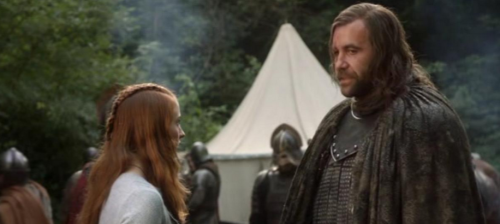
In the books, Joffrey’s sworn shield Sandor Clegane is an imposing figure, and his gruff demeanor terrifies Sansa initially. He seems to take a perverse pleasure in scaring her, in fact. This is apparent in their first one-on-one interaction with each other, when a drunken Sandor is commanded to escort Sansa back to her room in King’s Landing after a feast. As much as it’s clear that Sansa is frightened to look at him, it’s also made clear that it’s his behavior that she finds most upsetting:
‘Sandor Clegane snarled at her. “Spare me your empty little compliments, girl…and your ‘ser’s.’ I am no knight. I spit on them and their vows. My brother is a knight. Did you see him ride today?”
“Yes,” Sansa whispered, trembling. “He was…
“Gallant?” the Hound finished.
He was mocking her, she realized. “No one could withstand him,” she managed at last, proud of herself. It was no lie.
Sandor Clegane stopped suddenly in the middle of a dark and empty field. She had no choice but to stop beside him. “Some septa trained you well. You’re like one of those birds from the Summer Isles, aren’t you? A pretty little talking -bird, repeating all the pretty little words they taught you to recite.”
“That’s unkind.” Sansa could feel her heart fluttering in her chest. “You’re frightening me. I want to go now.”’
Sansa is a very nice person. And this quality is actually one of her greatest strengths, especially in light of the horrors she suffers and witnesses throughout the series. She reacts poorly to individuals that are unchivalrous or seemingly cruel. In the above scene, Sandor is being legitimately upsetting in his behavior. Yet once he breaks down and tells the story of his brother’s abuse, this is her reaction:
‘“My father told everyone my bedding had caught fire, and our maester gave me ointments. Ointments! Gregor got his ointments too. Four years later, they anointed him with the seven oils and he recited his knightly vows and Rhaegar Targaryen tapped him on the shoulder and said, ‘Arise, Ser Gregor.’”
The rasping voice trailed off. He squatted silently before her, a hulking black shape shrouded in the night, hidden from her eyes. Sansa could hear his ragged breathing. She was sad for him, she realized. Somehow, the fear had gone away. The silence went on and on, so long that she began to grow afraid once more, but she was afraid for him now, not for herself.
She found his massive shoulder with her hand. “He was no true knight,” she whispered to him.’
Sandor and Sansa did not have this scene in the TV show. Is it because D&D felt there wasn’t time? That would be a very legitimate reason to cut something from lengthy books for the visual medium. But unfortunately, no, they did include the story, delivered to Sansa by Littlefinger ( ?\_(?)_/? ) :
Petyr Baelish: Has anyone ever told you the story of the Mountain and the Hound? Lovely little tale of brotherly love. The Hound was just a pup, six years old maybe. Gregor a few years older, already a big lad, already getting a bit of a reputation. Some lucky boys just born with a talent for violence. One evening, Gregor found his little brother playing with a toy by the fire – Gregor’s toy, a wooden knight. Gregor never said a word, he just grabbed his brother by the scruff of his neck and shoved his face into the burning coals. Held him there while the boy screamed, while his face melted. There aren’t very many people who know that story.
Sansa Stark: I won’t tell anyone. I promise.
Petyr Baelish: No, please don’t. If the Hound so much as heard you mention it, I’m afraid all the knights in King’s Landing would not be able to save you.

To D&D, the story was merely something to characterize Gregor Clegane, and something to react to in horror, as they had Sansa do. Their repurposing of it significantly underplayed its true impact in the books: we see Sansa’s empathy so much on display that she feels scared for someone who outright upset her only moments before, and it’s to the point that by the next day, she is actively cheering for him at the Hand’s Tourney. This scene also marks the beginning of the breakdown of her illusions about chivalry and justice.
For adaptors who claim to “care” about Sansa, they blithely repurposed a significant moment for her and stripped her characterization down so that she reacts with quiet horror to a person who had no business telling it in the first place.
It is true that D&D kept the larger beats of Sansa’s story in, at least for the first few seasons. Ned losing his head certainly was the biggest catalyst for the wool to be pulled away from her eyes in both the books and the show. Yet even into Season 2, D&D excluded the relationships and moments that make Sansa…Sansa. As a captive in King’s Landing, her own resolve and empowerment is not chiefly obvious. However that does not mean it is not there. Sansa’s arc is what theculturalvacuum and I like to call “an arc containing subtle acts of resistance.” And at the same time, it is all about her learning to navigate a very dangerous situation while developing her unique skillset.
Sansa’s greatest strength, or her “weapon” is not a fugly necklace: it is her brain and her compassionate nature. On page, her relationship with the Hound serves to showcase both of this. Though even Martin has said that the showrunners “toyed” with the dynamic between Sandor and Sansa, they really just stripped it of all its context. It’s true that on the show, Sandor saves her from an almost-rape (which was dramatized for your TV, I should point out) and is vaguely nice to her. That’s about it.
In the books, their relationship is much different. I will never deny that there is a sexual element to it: there is. In fact Sansa’s sexual development is something treated intimately and extensively in the narrative, and the Hound is a part of that. Given the value placed on her “womanhood,” this isn’t shocking, and it serves a larger purpose to her story. The show, on the other hand, very much underplays her sexual development while in King’s Landing (and yes…perhaps it is uncomfortable to address a 13 year old experiencing urges for the first time, however realistic it may be). But then once D&D had need of Sansa to be an Empowered Woman™, they shot her through puberty to the point that she was giving flirtatious looks at Littlefinger while mincing around in vampish attire at Season 4’s close.
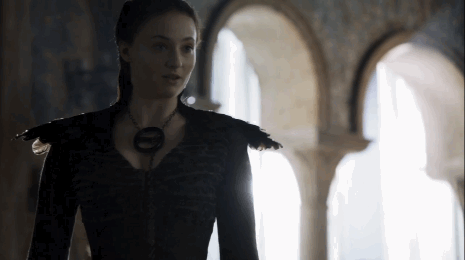
So yes, there’s a clear underplaying and simplification of her sexuality until it was ready to be used in a way that made for titillating television. That’s not acceptable.
But getting back to Sansa and Sandor’s relationship in the books, while I would never argue that there isn’t an erotic quality to their interactions (and one that very much colors her understanding of her own sexuality) it can’t be reduced to that. Her interactions with Sandor are some of the only times we get to see her being candid, which given how much she guards her thoughts is quite necessary to have. We also see Sandor force Sansa to face the harsh realities of the world time and time again, shattering any illusions she had from the stories and songs she grew up loving. At the same time he helps her, encouraging her to learn to lie, and watching out for her when he can to save her from abuse. It’s complicated and I never want to idealize it, but it’s damn important for her development. Above all else too, we learn that Sansa is far from superficial:
“She made herself look at that face now, really look. It was only courteous, and a lady must never forget her courtesies. The scars are not the worst part, nor even the way his mouth twitches. It’s his eyes. She had never seen eyes so full of anger.”
Sansa very much cares about Sandor in her own way. And while their dynamic can be viewed as a bit messed up, it’s clear that she sees who he really is. Her intuition is what guides her; it’s not his “ugliness” that she finds repellant, but his anger. And despite working for Joffrey, she even prays for him on the eve of the Battle of Blackwater:
“She sang for her mother and her father, for her grandfather Lord Hoster and her uncle Edmure Tully, for her friend Jeyne Poole, for old drunken King Robert, for Septa Mordane and Ser Dontos and Jory Cassel and Maester Luwin, for all the brave knights and soldiers who would die today, and for the children and the wives who would mourn them, and finally, toward the end, she even sang for Tyrion the Imp and for the Hound. He is no true knight but he saved me all the same, she told the Mother. Save him if you can, and gentle the rage inside him.“
Even though I would argue that the Hound is the most important relationship in ACOK that showcases her temperament, there are plenty of other moments in the book where we see Sansa’s empathy and overarching goodness:
‘“The only way to keep your people loyal is to make certain they fear you more than they do the enemy.”
“I will remember, Your Grace,” said Sansa, though she had always heard that love was a surer route to the people’s loyalty than fear. If I am ever a queen, I’ll make them love me.’
Despite the breakdown of her illusions about the kindness of the world, Sansa demonstrates her guiding motivations…motivations that are typically devalued or written off as “getting you killed.” It seems D&D agree with that sentiment given the exclusion of scenes that make this clear.
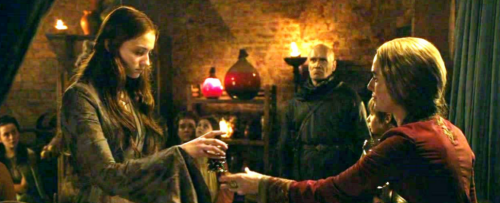
Further, Sansa’s kindness extends not just to the people that help her. When Lancel is injured in the Battle of Blackwater and comes to warn Cersei of the dangers, she coldly slams him in his wounds and leaves the room. Lancel Lannister is left spluttering on the floor, and this is Sansa’s reaction:
‘“Help him,” Sansa commanded two of the serving men. One just looked at her and ran, flagon and all. Other servants were leaving the hall as well, but she could not help that. Together, Sansa and the serving man got the wounded knight back on his feet. “Take him to Maester Frenken.” Lancel was one of them, yet somehow she still could not bring herself to wish him dead. I am soft and weak and stupid, just as Joffrey says. I should be killing him, not helping him.’
Even though Sansa is self-deprecatory about this, it’s a damn important quality of her character, and a quality that hints at what direction her character is likely to take. And all of this, excluded from the TV show.
That’s not to say that we didn’t see some acts of empathy on the part of Sansa. In both versions of the story, she saves the knight Ser Dontos from murder by convincing Joffrey that he’d make a better fool. However in the show, Dontos is completely shoved aside until a year later, when he grabs a bemused Sansa and tells her to wear a necklace at Joffrey’s wedding, and then later spirits her away from the scene without her awareness of what’s even happening. In the books, Dontos doesn’t go away. In fact, he and Sansa meet in secret on numerous, at great risk to her.
‘Come to the godswood tonight, if you want to go home.
The words were the same on the hundredth reading as they’d been on the first, when Sansa had discovered the folded sheet of parchment beneath her pillow. She did not know how it had gotten there or who had sent it. The note was unsigned, unsealed, and the hand unfamiliar. She crushed the parchment to her chest and whispered the words to herself. “Come to the godswood tonight, if you want to go home,” she breathed, ever so faintly.
What could it mean? Should she take it to the queen to prove that she was being good? Nervously, she rubbed her stomach. The angry purple bruise Ser Meryn had given her had faded to an ugly yellow, but still hurt. His fist had been mailed when he hit her. It was her own fault. She must learn to hide her feelings better, so as not to anger Joffrey.’
Here we see Sansa using incredibly strategic thinking and overanalyzing, another hallmark of her character. It also serves to emphasize the risk placed on her meetings with Dontos, and the proactivity Sansa took in her own escape. But we don’t get any of that. Sansa’s value and qualities are time and time again ignored. The show did nothing to seed Sansa’s development, or to showcase her skill-set.
I mean, it’s true that there were one or two moments where Sansa clearly was manipulating Joffrey:
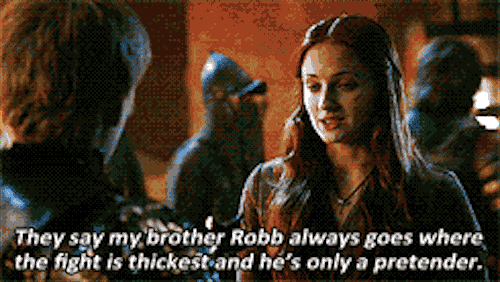
But for 99% of her screentime while in King’s Landing, she was simply a victim. In Season 3 they had her back in an overly idealistic mindset with her betrothal to Loras. In the books, Sansa does gave an initial glimmer of hope with the appearance of the Tyrells. After all, they are a powerful House that did have the clout and power to get her out of King’s Landing. But the issue with the show’s portrayal is that it went beyond this. They stripped Sansa of one of her fundamental strengths: her intuition/remarkable read on people. In the books, she doesn’t meet the Tyrell she’s to marry. In the show, Sansa blissfully prattles on to a disinterested Loras, and we’re intended to laugh because…he’s GAY. And gay men don’t like women! Get it?!!
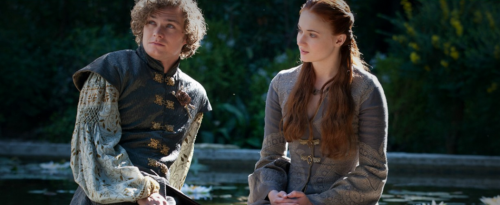
Moving beyond how personally offensive I find the fact that they reduced Loras Tyrell to his sexuality, what they also accomplished was the casual dialing back Sansa’s characterization for the sake of a joke. Or perhaps eradication of her characterization, more accurately.
Even more, they kept Sansa in an unironic friendship with Margaery, even after their alliance was taken off the table. Contrasting to the books, it’s made clear that the Tyrells never cared about her, something she realizes at her wedding to Tyrion, and something that colors her actions moving forward:
‘“I do solemnly proclaim Tyrion of House Lannister and Sansa of House Stark to be man and wife, one flesh, one heart, one soul, now and forever, and cursed be the one who comes between them.”
She had to bite her lip to keep from sobbing.
The wedding feast was held in the Small Hall. There were perhaps fifty guests; Lannister retainers and allies for the most part, joining those who had been at the wedding. And here Sansa found the Tyrells. Margaery gave her such a sad look, and when the Queen of Thorns tottered in between Left and Right, she never looked at her at all. Elinor, Alla,and Megga seemed determined not to know her. My friends, Sansa thought bitterly.’
So the Sansa that we see on our screen in King’s Landing is a Sansa that was stripped of everything unique to her character. D&D claim she’s one of their favorites, yet…what do they like about her exactly? They made conscious and continual changes that all served to undercut her development and to keep her a passive victim.
Is it fair to call these changes to Sansa’s arc “sexism”? It does demonstrate a clear devaluing of skills and actions that don’t fit into a mold of their idea of an “empowered woman,” who for D&D seem to need to be either sexual manipulators like Margaery, or simplified badasses like Brienne and Talisa. So yes, I would say that underplaying the empowerment that Sansa gains through her intuition, analyzation, and empathy are based on sexist assumptions, which is highlighted even more so by the “empowered” mold they gave us at the end of Season 4:
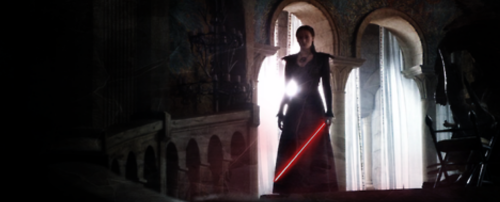
Sexist assumptions don’t necessarily mean anything intentional on the part of the writers. I do think D&D believe they are being progressive when they shove more “agency” onto their women characters, no matter how much it undercuts the themes of the narrative (I talk extensively about this in my meta “GoT Meta: Depiction vs. Endorsement, and Sexism”).
But it is the portrayal of Sansa’s relationship with Tyrion where we are subjected to outright and deliberate sexism within her arc.
In the meta I just linked, I briefly discuss how D&D play into the “nice guy trope.” This is the trope that a Good Guys™ who have the charming ability to not be awful to women deserve the affection of women. It is not an uncommon concept that many in our society buy into. But as I say in the essay:
“…this isn’t to say that nice men don’t deserve to be happy. But the harm of the trope is that it underplays women’s agencies and feelings. They are simply expected to bestow affection onto these nice men for the inherent reason that…they are nice. And any rejection is automatically viewed as a negative.”
In the show, D&D have done everything they can to portray Tyrion as an unproblematic Good Guy™. They completely erased his more messed up actions from the books, because they wanted him to be the hero. Perhaps it comes from a good place: Tyrion is a character who suffers greatly due to his disability, and the desire to protect someone so marginalized is something to consider. And though that’s a sympathetic reason to want to write a character in a more positive light, it in many ways reduces his character to nothing but his disability. Martin respected Tyrion enough to be able to present him in a morally grey light. And to me, that is true progressivism. His disability clearly informed his character, and for that reason we do sympathize with Tyrion and understand this. But it never excuses him from responsibility for his actions and agency. That matters.
Instead, D&D opted to have Tyrion commit no wrongs. But what’s particularly upsetting is that they way they have gone about accomplishing this has significantly decreased the agency of literally every woman around him. For instance, a sex slave in a brothel (a woman inherently devoid of agency and the ability to consent), is changed from a woman with deadened eyes who has clearly suffered abuses that Tyrion still proceeds to intimidate and rape twice (knowing full well it’s wrong), to a perky woman who is sad men weren’t paying her mind, and is so charmed by Tyrion’s wit that she offers him free sex. Which he refuses. To call this “offensive” might be an understatement. Especially given that they didn’t need to show that interaction at all. They had Tyrion refuse her offer, so WHY WAS IT IN?
When it comes to Tyrion and Sansa, the whitewashing of his actions is a bit more concerning, because it’s something that undercuts Sansa’s characterization. This begins even before their marriage, when Sansa is alerted to the wedding ahead of time. In the books, she is blindsided. Cersei has a nice dress made for her, and after her fitting, she is shoved into the sept for a surprise wedding. Tyrion does give her the option to marry Lancel instead, but she remembers how he had been vaguely nice to her before, and in her eyes, it’s not like a different Lannister is going to make this better. Make no mistake: Sansa has ZERO agency in this situation. All Tyrion was offering her was a choice of gaoler.
Tyrion, on the other hand, had all the agency in the world:
‘“If you will not have the Stark girl, I shall find you another wife. Somewhere in the realm there is doubtless some little lordling who’d gladly part with a daughter to win the friendship of Casterly Rock. Lady Tanda has offered Lollys … ”
Tyrion gave a shudder of dismay. “I’d sooner cut it off and feed it to the goats.”
“Then open your eyes. The Stark girl is young, nubile, tractable, of the highest birth, and still a maid. She is not uncomely. Why would you hesitate?”
Why indeed? “A quirk of mine. Strange to say, I would prefer a wife who wants me in her bed.”
[…]
“You shall never have Casterly Rock, I promise you. But wed Sansa Stark, and it is just possible that you might win Winterfell.”
Tyrion Lannister, Lord Protector of Winterfell. The prospect gave him a queer chill. “Very good, Father,” he said slowly, “but there’s a big ugly roach in your rushes. Robb Stark is as capable as I am, presumably, and sworn to marry one of those fertile Freys.
And once the Young Wolf sires a litter, any pups that Sansa births are heirs to nothing.”’
He was not given an ultimatum, he was given an opportunity. And in the end the focus is on how exactly he’d get Winterfell, not on like…Sansa’s feelings or anything. And note no outright yelling commands on the part of Tywin. Tyrion could have said no.
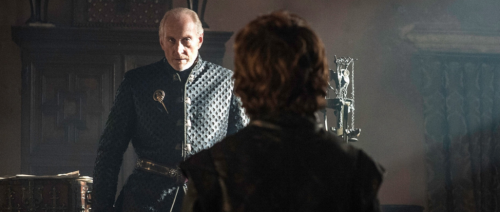
On the show, Sansa has a few days to think about her wedding to Tyrion, during which she continues her unironic friendship with Margaery Tyrell, who encourages her to have sex with Tyrion. According to her, he’s “not the worst Lannister.” So therefore because he has shown that he’s not into the random mistreatment of prisoners, Sansa is encouraged to “make the most of it.” Sansa in this scene is painted in nothing but a complete naive light. She’s making no arrangements to escape this fate, and only showcases bemusement at Margaery’s sex tips. None of her keeping her feelings hidden behind her “armor of courtesy” and nothing that even implies she has developed at all since they chopped Ned’s head off.
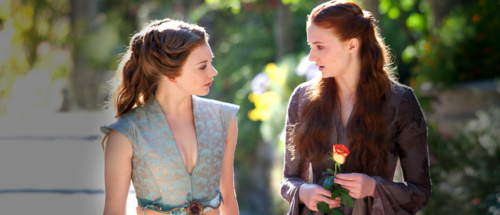
And it’s also marked that they only employed her friendship with Margaery for this scene; once the Purple Wedding comes around it is retconned out of existence.
Still, the most egregious dialing back of her characterization for the sake of Tyrion’s comes during the wedding. As I said before, Sansa in the books is all about her subtle acts of resistance. Her mode of survival is to hide behind something she calls an “armor of courtesy.” She hides her true thoughts and feelings, while donning a mask of politeness. In this way, she is innocuous and flies under everyone’s radar.
‘Dontos was prattling on. “If I were still a knight, I should have to put on armor and man the walls with the rest. I ought to kiss King Joffrey’s feet and thank him sweetly.”
“If you thanked him for making you a fool, he’d make you a knight again,” Sansa said sharply.
Dontos chuckled. “My Jonquil’s a clever girl, isn’t she?”
“Joffrey and his mother say I’m stupid.”
“Let them. You’re safer that way, sweetling.”’
Yet she refuses to let herself be completely passive. The example of manipulating Joffrey just before the Battle of Blackwater is a great one. But the best example, the one she is perhaps most known for, is conspicuously absent from the show: Sansa refuses to kneel for Tyrion at her wedding.
‘As he moved behind her, Sansa felt a sharp tug on her skirt. He wants me to kneel, she realized, blushing. She was mortified. It was not supposed to be this way. She had dreamed of her wedding a thousand times, and always she had pictured how her betrothed would stand behind her tall and strong, sweep the cloak of his protection over her shoulders, and tenderly kiss her cheek as he leaned forward to fasten the clasp. She felt another tug at her skirt, more insistent. I won’t. Why should I spare his feelings, when no one cares about mine?
The dwarf tugged at her a third time. Stubbornly she pressed her lips together and pretended not to notice. Someone behind them tittered. The queen, she thought, but it didn’t matter. They were all laughing by then, Joffrey the loudest. “Dontos, down on your hands and knees,” the king commanded. “My uncle needs a boost to climb his bride.”
And so it was that her lord husband cloaked her in the colors of House Lannister whilst standing on the back of a fool.
When Sansa turned, the little man was gazing up at her, his mouth tight, his face as red as her cloak. Suddenly she was ashamed of her stubbornness. She smoothed her skirts and knelt in front of him, so their heads were on the same level. “With this kiss I pledge my love, and take you for my lord and husband.”’
It’s goddamn important that Sansa asserts herself where she can. She is in a situation of no agency, and yet won’t ignore or underplay her own desires. This continues into the wedding night, where in the books, Tyrion is much less well-behaved. He gropes at her naked body and nearly goes through with the act, in fact:
‘“You’re a child,” he said.
She covered her breasts with her hands. “I’ve flowered.”
“A child,” he repeated, “but I want you. Does that frighten you, Sansa?”
“Yes.”
“Me as well. I know I am ugly—”
“No, my—”
He pushed himself to his feet. “Don’t lie, Sansa. I am malformed, scarred, and small, but…” she could see him groping “…abed, when the candles are blown out, I am made no worse than other men. In the dark, I am the Knight of Flowers.” He took a draught of wine. “I am generous. Loyal to those who are loyal to me. I’ve proven I’m no craven. And I am cleverer than most, surely wits count for something. I can even be kind. Kindness is not a habit with us Lannisters, I fear, but I know I have some somewhere. I could be…I could be good to you.”
He is as frightened as I am, Sansa realized. Perhaps that should have made her feel more kindly toward him, but it did not. All she felt was pity, and pity was death to desire. He was looking at her, waiting for her to say something, but all her words had withered. She could only stand there trembling.’
It’s super, super nice that Tyrion didn’t rape her. That was great of him. But you don’t get brownie points for acts of basic human decency. I think it is also notable that despite her terror, Sansa absolutely has Tyrion pegged, though throughout their marriage her “armor of courtesy” continually frustrates and bemuses him to the point where he even wonders if she’s jealous that Margaery is marrying Joffrey of all people. This really highlights her remarkable intuition, once again.
The way Martin paints their marriage in the books makes the mentality of both parties quite obvious. We are in both Tyrion and Sansa’s heads at different points, and we understand where they’re coming from. Sansa views Tyrion as a Lannister first and foremost, and though she has sympathy for him, she never, ever lets him in:
‘“You loved your brothers, much as I love Jaime.”
Is this some Lannister trap to make me speak treason? “My brothers were traitors, and they’ve gone to traitors’ graves. It is treason to love a traitor.”
[…]
What does he want me to say? “That is good to know, my lord.” He wanted something from her, but Sansa did not know what it was. He looks like a starving child, but I have no food to give him. Why won’t he leave me be?’
Contrast this to the show, where Sansa jokes about putting sheep dung into a mattress because someone said something bad about him, and is so adorable in her naivety that she doesn’t even know the word “shit.”
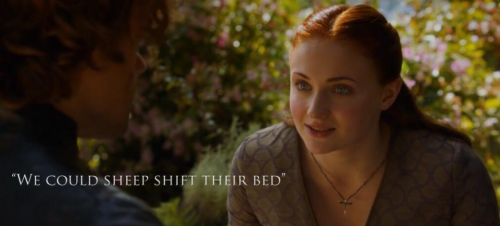
Martin describes Tyrion, for his part, as being chiefly concerned about…Tyrion.
“And their nights together in the great bed were another source of torment. He could no longer bear to sleep naked, as had been his custom. His wife was too well trained ever to say an unkind word, but the revulsion in her eyes whenever she looked on his body was more than he could bear. Tyrion had commanded Sansa to wear a sleeping shift as well. I want her, he realized. I want Winterfell, yes, but I want her as well, child or woman or whatever she is. I want to comfort her. I want to hear her laugh. I want her to come to me willingly, to bring me her joys and her sorrows and her lust. His mouth twisted in a bitter smile.”
He desires Sansa, and continually reflects on that, as well as his desire for Winterfell. He wants her affection, for sure. He wants to feel loved. And that’s understandable. But Tyrion is 27 and she is a 13-year-old political prisoner. The way he approaches this marriage and thinks about her borders on voyeurism:
“She is just as comely as the Tyrell girl. Her hair was a rich autumn auburn, her eyes a deep Tully blue. Grief had given her a haunted, vulnerable look; if anything, it had only made her more beautiful. He wanted to reach her, to break through the armor of her courtesy.”
It’s sick that he is gaining pleasure from her grief. Still, it’s clear that Sansa’s rejections of his desire for intimacy (emotional and physical) are due to the fact that she was forced into a marriage to the family who killed hers. And the gross part is that Tyrion understands this:
“Sansa’s misery was deepening every day. Tyrion would gladly have broken through her courtesy to give her what solace he might, but it was no good. No words would ever make him fair in her eyes. Or any less a Lannister. This was the wife they had given him, for all the rest of his life, and she hated him.”
Note, “they had given him,” as if he was a victim in this situation too. He had every ability to stop this. He didn’t because he wanted Winterfell. And it’s also quite telling that after Sansa flees King’s Landing and Tyrion is imprisoned, this is how he chooses to conceive of their dynamic:
“One flesh, one heart, one soul. His mouth twisted. She wasted no time proving how much those vows meant to her, did she? Well, what did you expect, dwarf?”
Look, there’s no denying that Sansa was not attracted to Tyrion because of his physicality.
“Look at him, Sansa told herself, look at your husband, at all of him, Septa Mordane said all men are beautiful, find his beauty, try. She stared at the stunted legs, the swollen brutish brow, the green eye and the black one, the raw stump of his nose and crooked pink scar, the coarse tangle of black and gold hair that passed for his beard. Even his manhood was ugly, thick and veined, with a bulbous purple head. This is not right, this is not fair, how have I sinned that the gods would do this to me, how?”
But she never dismissed him for this reason alone. He was a Lannister first and foremost, and you know what? It’s not fair. Hence her refusal to kneel at her wedding. Besides, as was demonstrated with Sandor, it’s not “ugliness” that causes Sansa to write someone off, but their treatment of her and their behavior. Tyrion’s continual efforts to penetrate her “armor” exhaust her. She sees where he’s coming from and has sympathy (pity) for him, but she is steadfast in her refusal to let him in.
However, in the show, their relationship is portrayed in a much different light. There’s the kneeling at the wedding, the lighthearted jokes, the chaste wedding night scene.
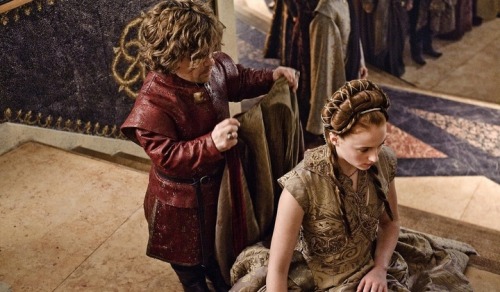
Even after she learns about the slaughter of her family where Sansa is trying to make space for herself, she tells what she’s doing to Tyrion:
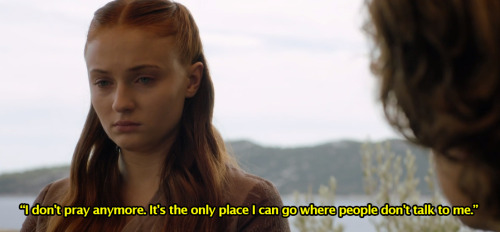
In D&D’s portrayal, Sansa is more than happy to share her thoughts with Tyrion, even calling attention to her “armor of courtesy” that serves as her survival mechanism and only form of protection.
This significantly undercuts Sansa’s character, and it is done for the benefit of Tyrion’s. Why? because to D&D, the story would have been better if Sansa kneeled. Do they think their version of the story is less ableist? It’s certainly possible that’s what’s underscoring it. But I think to really get at what’s going on here, we need to look at the sum total of Sansa’s arc: and that includes her rape on Sunday night.
I was expressing my disgust over it to a guy-friend of mine, and he told me “it felt like a rejected high school boy’s fantasy.” While that does seem like a little bit of an unfair assumption to make, it is hard to ignore the fact that D&D have gone to great lengths to “fix” Sansa’s rejection of Tyrion. More disquieting still was her mentioning of him in a kind light moments before her violation. It could almost, therefore, be viewed as a punishment, as if to say “she didn’t value him enough.”
The thing is, there was nothing to “fix.” Sansa had no goddamn reason to bow to Tyrion at the wedding or to make jokes with him afterwards. D&D made her, because they felt she should have bestowed that affection onto him. And given their total whitewashing of his character in all aspects of the show, it does seem like they treat Tyrion as a woobie:
“A ‘woobie’ is a name for any type of character who makes you feel extremely sorry for them. Basically, the first thing you think to say when you see the woobie is: “Aw, poor baby!” Woobification of a character is a curious, audience-driven phenomenon, sometimes divorced from the character’s canonical morality.”
“Divorced from the character’s canonical morality” doesn’t even begin to define D&D’s interpretation of Tyrion. And the thing with Tyrion is that he does indulge in quite a bit of self-pity and rationalizations within his chapters (see above quote where he thinks about the “wife they gave him”), so it’s easy to be lulled into agreeing with him without critical thought. But his thoughts about women are particularly concerning because they are centered around the assumption that he is owed their affections. For adaptors to not see an issue inherent there is…problematic, to say the least.
Perhaps they do relate to Tyrion on some level, and he has become a sort of authorial avatar. If that’s the case, then Sansa’s arc is all the more sickening. But even in absence of that psychological explanation for their changes, D&D were clearly of the belief that Sansa’s character was better served kneeling for Tyrion at the wedding. This is why they had her do it. They “fixed” it so she would bestow affection onto Tyrion. For that reason, it is clear that D&D took a fundamentally sexist approach in adapting her to the screen. And it definitely demonstrates that they do not care about anything her character stands for or represents.
So then what more is there to be said? Of course they’d include her rape for shock-value. Of course they wouldn’t even think about the empathetic reaction on the part of the audience…they’ve seemed to hold little empathy for her themselves. There’s no sense that can be applied to what we saw on Sunday.
I could discuss how gratuitous violence against women is often employed by the show to shock us (see my previously linked meta). I could also point out how Sansa was made an object in her own violation: the focus was on Theon’s face, not hers, and the role she is fulfilling this year is in place of someone who serves Theon’s arc, not hers. But myself and many others have spoken about this already. Even professional critics are finally coming out in droves to condemn this scene.
The fact is, D&D defied every bit of in-verse logic to place Sansa into this role, because they wanted her to be raped on screen. And don’t for one second think that this was necessary. Did Sansa need to be raped to hate the Boltons? No. Did Sansa need her characterization dialed back to a greater thematic effect? Because if your narrative requires characters to be making illogical decisions that undo their development, that’s not the mark of good storytelling.
And for the love of the Seven, don’t let D&D fool you when they say they care deeply about Sansa. They have ignored or underplayed every single one of her characteristics that is unique and central to her character. They kept her passive and naive for as long as they possibly could in King’s Landing to benefit other storylines and characters. They shoved her into a mold of their idea of an Empowered Woman™ without bothering to seed any of it, or despite the fact that Sansa’s sexuality was sorely underdeveloped throughout the entire series. Then they marketed her to us as an empowered character in all of this season’s promotional videos and articles, which I can only guess was to add to the horror that was to come. And now, they’ve pushed away what little bit of growth they allowed her so that she could become a silent sufferer in someone else’s storyline.
Is it “revenge”? Again, who’s to say. But what’s damn clear is they have gone out of their way to “correct” her behavior around Tyrion, because her book counterpart had the audacity to not want to be married into a family that was responsible for her suffering, and didn’t shower him with affection when he showed the tiniest shred of decency towards her. With Sunday’s episode they have punished her character on screen in the most horrific and senseless way possible. Launched in 2010, mSpy has grown to one of the most popular and well-known monitoring software programs in the world. It’s reliable, easy to set up, and works on jailbroken & non-jailbroken iOS devices and Android devices. Installation is simple and takes only a few minutes. The app runs in background mode and is invisible to the phone user, so your kids will never know that you are spying on them. Before buying a spy phone app check mSpy reviews – mSpy is designed for monitoring your children, employees or others on a phone that you own or have permission to monitor. #mspy #free-trial #spy #app Call it what you will, but for me there’s only one word to use that’s appropriate for their entire treatment of Sansa Stark: sexism. And it’s been there all along.
Images courtesy of HBO. This post was original hosted on Kylie’s GoT Tumblr blog.

